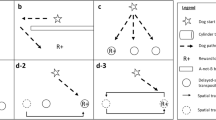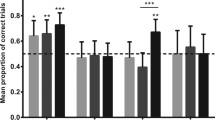Abstract
Past research has suggested that a variety of factors, phylogenetic and ontogenetic, play a role in how canines behave during problem-solving tasks and the degree to which the presence of a human influences their problem-solving behaviour. While comparisons between socialized wolves and domestic dogs have commonly been used to tease apart these predictive factors, in many cases a single dog population, often pets, have been used for these comparisons. Less is understood about how different populations of dogs may behave when compared with wolves, or with each other, during an independent problem-solving task. This experiment compared the independent persistence of four populations of canines (two groups of pet domestic dogs, a group of free-ranging domestic dogs, and human-socialized wolves) on an independent problem-solving task in the presence of an on looking human. Results showed that wolves persisted the most at the task while free-ranging dogs persisted the least. Free-ranging dogs gazed at the human experimenter for the longest durations during the task. While further research is needed to understand why these differences exist, this study demonstrates that dogs, even those living outside human homes as scavengers, show comparatively low levels of persistence when confronted with a solvable task in the presence of a human as well as significantly greater duration of human-directed gaze when compared with wolves.


Similar content being viewed by others
References
Benson-Amram S, Holekamp KE (2012) Innovative problem solving by wild spotted hyenas. Proc R Soc B 279(1744):4087–4095. doi:10.1098/rspb.2012.1450
Bentosela M, Barrera G, Jakovcevic A, Elgier A, Mustaca A (2008) Effect of reinforcement, reinforcer omission and extinction on a communicative response in domestic dogs (Canis familiaris). Behav Process 78(3):464–469. doi:10.1016/j.beproc.2008.03.004
Bentosela M, Wynne CDL, D’Orazio M, Elgier A, Udell MAR (2016) Sociability and gazing toward humans in dogs and wolves: simple behaviours with broad implications. J Exp Anal Behav 105(1):68–75. doi:10.1002/jeab.191
Bhadra A, Bhattacharjee D, Paul M, Singh A, Gade PR, Shrestha P, Bhadra A (2015) The meat of the matter: a rule of thumb for scavenging dogs? Ethol Ecol Evol 28(4):1–14. doi:10.1080/03949370.2015.1076526
Chow PKY, Lea SEG, Leaver LA (2016) How practice makes perfect: the role of persistence, flexibility and learning in problem-solving efficiency. Anim Behav 112:273–283. doi:10.1016/j.anbehav.2015.11.014
Coppinger R, Coppinger L, Beck AM (2016) What is a dog?. The University of Chicago Press, Chicago
D’Aniello B, Scandurra A (2016) Ontogenetic effects on gazing behaviour: a case study of kennel dogs (Labrador Retrievers) in the impossible task paradigm. Anim Cogn 19(3):565–570. doi:10.1007/s10071-016-0958-5
D’Aniello B, Scandurra A, Prato-Previde E, Valsecchi P (2015) Gazing toward humans: a study on water rescue dogs using the impossible task paradigm. Behav Process 110:68–73. doi:10.1016/j.beproc.2014.09.022
Fiset S, Plourde V (2013) Object permanence in domestic dogs (Canis lupus familiaris) and gray wolves (Canis lupus). J Comp Psychol 127(2):115–127. doi:10.1037/a0030595
Frank H, Frank MG (1982) Comparison of problem-solving performance in six-week-old wolves and dogs. Anim Behav 30(1):95–98. doi:10.1016/S0003-3472(82)80241-8
Gácsi M, Gyori B, Virányi Z, Kubinyi E, Range F, Belényi B, Miklósi A (2009) Explaining dog wolf differences in utilizing human pointing gestures: selection for synergistic shifts in the development of some social skills. PLoS ONE. doi:10.1371/journal.pone.0006584
Hall NJ, Lord K, Arnold A-MK, Wynne CDL, Udell MAR (2015) Assessment of attachment behaviour to human caregivers in wolf pups (Canis lupus lupus). Behav Process 110:15–21. doi:10.1016/j.beproc.2014.11.005
Jakovcevic A, Elgier AM, Mustaca AE, Bentosela M (2010) Breed differences in dogs’ (Canis familiaris) gaze to the human face. Behav Process 84(2):602–607. doi:10.1016/j.beproc.2010.04.003
Klinghammer E, Goodman P (1987) Socialization and management of wolves in captivity. In: Frank H (ed) Man and wolf: advances, issues, and problems in captive wolf research. Kluwer Academic Publishers, Dordrecht, pp 31–61
Lazarowski L, Dorman DC (2015) A comparison of pet and purpose-bred research dog (Canis familiaris) performance on human-guided object-choice tasks. Behav Process 110:60–67. doi:10.1016/j.beproc.2014.09.021
Marshall-Pescini S, Passalacqua C, Barnard S, Valsecchi P, Prato-Previde E (2009) Agility and search and rescue training differently affects pet dogs’ behaviour in socio-cognitive tasks. Behav Process 81(3):416–422. doi:10.1016/j.beproc.2009.03.015
Marshall-Pescini S, Colombo E, Passalacqua C, Merola I, Prato-Previde E (2013) Gaze alternation in dogs and toddlers in an unsolveable task: evidence of an audience effect. Anim Cogn 16:933–943. doi:10.1007/s10071-013-0627-x
Mech LD (2012) The wolf: the ecology and behaviour of an endangered species. Natural History Press, Garden City
Miklósi Á, Kubinyi E, Topál J, Gácsi M, Virányi Z, Csányi V (2003) A simple reason for a big difference: wolves do not look back at humans, but dogs do. Curr Biol 13(9):763–766. doi:10.1016/S0960-9822(03)00263-X
Nagasawa M, Mitsui S, En S, Ohtani N, Ohta M, Sakuma Y, Onaka T, Mogi K, Kikusui T (2015) Oxytocin-gaze positive loop and the coevolution of human-dog bonds. Science 348(6232):333–336. doi:10.1126/science.1261022
Ortolani A, Vernooij H, Coppinger R (2009) Ethiopian village dogs: behavioural responses to a stranger’s approach. Appl Anim Behav Sci 119(3–4):210–218. doi:10.1016/j.applanim.2009.03.011
Passalacqua C, Marshall-Pescini S, Barnard S, Lakatos G, Valsecchi P, Prato Previde E (2011) Human-directed gazing behaviour in puppies and adult dogs, Canis lupus familiaris. Anim Behav 82(5):1043–1050. doi:10.1016/j.anbehav.2011.07.039
Paul M, Majumder SS, Nandi A, Bhadra A (2015) Selfish mothers indeed! resource-dependent conflict over extended parental care in free-ranging dogs. R Soc Open Sci 2(12):150580. doi:10.1098/rsos.150580
Range F, Möslinger H, Virányi Z (2012) Domestication has not affected the understanding of means-end connections in dogs. Anim Cogn 15(4):597–607. doi:10.1007/s10071-012-0488-8
Scandurra A, Prato-Previde E, Valsecchi P, Aria M, D’Aniello B (2015) Guide dogs as a model for investigating the effect of life experience and training on gazing behaviour. Anim Cogn 18(4):937–944. doi:10.1007/s10071-015-0864-2
Thornton A, Samson J (2012) Innovative problem solving in wild meerkats. Anim Behav 83(6):1459–1468. doi:10.1016/j.anbehav.2012.03.018
Udell MAR (2015) When dogs look back: inhibition of independent problem-solving behaviour in domestic dogs (Canis lupus familiaris) compared with wolves (Canis lupus). Biol Lett 11(9):20150489. doi:10.1098/rsbl.2015.0489
Udell MAR, Wynne CDL (2010) Ontogeny and phylogeny: both are essential to human-sensitive behaviour in the genus Canis. Anim Behav 79(2):e9–e14. doi:10.1016/j.anbehav.2009.11.033
Udell MAR, Dorey NR, Wynne CDL (2008) Wolves outperform dogs in following human social cues. Anim Behav 76(6):1767–1773. doi:10.1016/j.anbehav.2008.07.028
Udell MAR, Dorey NR, Wynne CDL (2009) What did domestication do to dogs? a new account of dogs’ sensitivity to human actions. Biol Rev 85(2):327–345. doi:10.1111/j.1469-185X.2009.00104.x
Udell MAR, Dorey NR, Wynne CDL (2010) The performance of stray dogs (Canis familiaris) living in a shelter on human-guided object-choice tasks. Anim Behav 79(3):717–725. doi:10.1016/j.anbehav.2009.12.027
Udell MAR, Dorey NR, Wynne CDL (2011) Can your dog read your mind? understanding the causes of canine perspective taking. Learn Behav 39(4):289–302. doi:10.3758/s13420-011-0034-6
Udell MAR, Ewald M, Dorey NR, Wynne CDL (2014) Exploring breed differences in dogs: does exaggeration or inhibition of predatory response predict human-guided task performance? Anim Behav 89:99–105. doi:10.1016/j.anbehav.2013.12.012
Virányi Z, Gácsi M, Kubinyi E, Topál J, Belényi B, Ujfalussy D, Miklósi Á (2008) Comprehension of human pointing gestures in young human-reared wolves (Canis lupus) and dogs (Canis familiaris). Anim Cogn 11(3):373–387. doi:10.1007/s10071-007-0127-y
Acknowledgements
We are grateful to the dogs and dog owners who volunteered their time for this study. We would also like to thank Wolf Park, especially manager Dana Drenzek and assistant curator Brian Gaston for their help with this study, Giovanna Rosenlicht, Kristyn Shreve, Lauren Thielke, Shelby Wanser, Helen Dillman, and other members of the HAI laboratory who assisted with data collection, coding, and analysis. We would like to give special thanks to the Oregon State University Graduate School and Animal Science Department, and the Department of Science and Technology at the Indian Institute of Science Education and Research Kolkata for supporting this research.
Author information
Authors and Affiliations
Corresponding authors
Ethics declarations
Ethical standards
All owned subjects were volunteered by their owners or caretakers and remained in their care for the duration of the study. All free-ranging dogs were tested in their home environment. Owners were not asked to food deprive their dogs or engage in any other activity that might compromise their well-being and were free to withdraw their animal at any time (something that never happened). All procedures performed were in accordance with the ethical standards of Oregon State University and the Indian Institute of Science Education and Research and with the laws of the USA and of India. This study was approved by the Oregon State University Institutional Animal Care and Use Committee, ACUP #4444.
Rights and permissions
About this article
Cite this article
Brubaker, L., Dasgupta, S., Bhattacharjee, D. et al. Differences in problem-solving between canid populations: Do domestication and lifetime experience affect persistence?. Anim Cogn 20, 717–723 (2017). https://doi.org/10.1007/s10071-017-1093-7
Received:
Revised:
Accepted:
Published:
Issue Date:
DOI: https://doi.org/10.1007/s10071-017-1093-7




